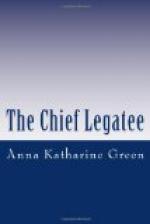“Try it,” said he. Then with a laugh so low as to be almost inaudible, yet so full of meaning that even Harper’s cheek lost color, he calmly declared: “No one knows the name of our Chief. Auchincloss is a member and a valuable one—the only one whose name Georgian positively knows; but he’s but a unit in a thousand. You cannot reach the Head or even the Heart of this great organization through him, and if you did and punished it, the Cause would grow another head and you would be as far from injuring us as you are now. Georgian is right. Not even I can save her now.” Then, with a steady look into each of their faces, he smiled again and one and all shuddered. “But the Cause will go on,” he cried in tones ringing with enthusiasm. “Mankind will drop its shackles and we, we shall have unriveted one of its chains. It is worth dying for, I, Alfred Hazen, say it.”
Slowly he sank back into his chair. The pallor which had astounded all from the first had now become the ghastly mask of a soul whose only token of life glimmered through the orbits of his fast glazing eyes. He breathed, but in great pants. Georgian became alarmed.
“What is it?” she cried, forgetting her own fears and threats in the horror which his appearance excited. “This is something more than exhaustion from the pounding of that murderous eddy. What have you done? Tell me, Alfred, tell me.”
For the first time since his entrance into the room a suggestion of sweetness crept into his tone.
“Simply forestalled the verdict of the Chief,” said he. “I was under oath to leave the country to-day on no ordinary errand. I failed to keep my word, believing that the interests of the Cause could be better served by what I have here undertaken than by the fulfilment of my primal duty. But we are not allowed the free exercise of our own judgment, else what man could be depended on? With us, neglect means death, no matter what the excuse or the Cause’s benefit. I knew this when I made my choice last night. I have been dying ever since, but only actually since I came into this room. When the doctors decided that I had received no mortal hurt in the eddy, I—”
“Alfred!” The sister-heart spoke at last. “Not—not poison!”
“That is what you may call it here,” said he, with a return to his old imperious manner, “but later and to the world it will be kindness on your part to name it exhaustion—the effect of my battle with the water. The doctors will reconsider their diagnosis and blame my poor heart. You will have no trouble about it. It is my heart—I feel it failing—failing—”
He was sinking, but suddenly his whole nature flared up. Bounding to his feet, he stood before them, with eyes aflame and a passionate strength in his attitude which held them spellbound.




